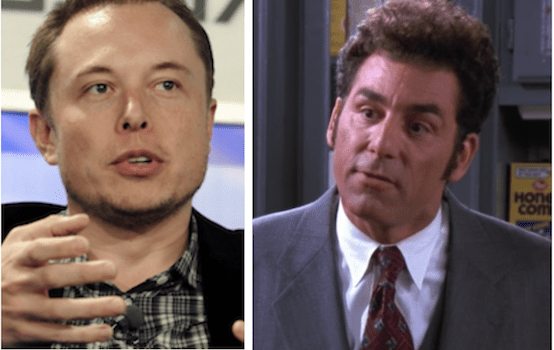Elon Musk is the Cosmo Kramer of Crony Capitalism

Anyone familiar with the hit sitcom Seinfeld knows that Cosmo Kramer, the rambunctious, eccentric neighbor of Jerry Seinfeld, had a lot of big ideas. From make-your-own-pizza parlors to tie dispensers to the infamous “mansierre,” Kramer was—in his own mind—a world-changing revolutionary.
Of course, aside from one notable exception (the Regis Philbin-approved pop-out coffee table book), none of his ideas ever panned out. But lack of achievement is exactly what viewers expected every week. The whole fun of Kramer was his dream-big mentality and the impracticality that came with it.
No one on the show was senseless enough to support Kramer in his work. In fact, in one episode, Leland fired him even though he did not hold any standing position. Kramer couldn’t even keep a job at a bagel store for longer than a few days. It was his friends’ open refrigerators that provided him with the life support he needed to continue dreaming and inventing.
This comedy sitcom case study is ironically much more sensible than what occurs in real life. There are plenty of Cosmo Kramers out in the world today with ideas that are even more ambitious than anything Kramerica Industries could have formulated. The only difference is that these individuals have armies of lobbyists that can convince our spendthrift government to finance their ideas, even though they have yet to pass any free-market smell tests.
Perhaps the most recent example of such a politically astute, Kramer-like figure is Elon Musk. This larger-than-life media personality plans to do everything from sending men to the moon and Mars, to creating a 700-miles-per-hour tunnel transportation system, to turbocharging human brains by implanting computers.
All of these are excellent ideas, to be sure, but ones that bear significant amounts of risk. Unfortunately, Mr. Musk does not seem willing to bear all the risk himself. His business model revolves around hiring experts to navigate the waters of the Washington swamp to discover ways to make the American people pick up the tab.
Take Tesla, for example. The car company was created to bring electric vehicles to the general public en masse—a mission that oddly requires over $1 million in lobbying expenditures annually. As a result, the cars are financed by over $280 million in federal tax incentives, including a $7,500 federal tax break, and tens of millions more in state rebates and development fees.
Despite receiving all this government money, Musk’s company has not shown demonstrable results. Yesterday, Bloomberg released a story under the headline “Tesla Doesn’t Burn Fuel, It Burns Cash,” detailing how the company spends $6,500 a minute and may run out of money by the end of the year. Just weeks ago, Moody’s downgraded Tesla’s credit rating due to its seeming inability to meet deadlines. Mr. Musk’s estimate of producing 20,000 vehicles in December, for instance, turned into just over 2,400 in the entire fourth quarter.
It is no wonder that when these government subsidies die, electric vehicle sales plummet. Three years ago, sales sunk by more than 80 percent in the state of Georgia when the $5,000 state tax credit phased out. Last year, sales declined by 60 percent when its EV tax breaks sharply fell. These empirical case studies do not paint a positive picture of Tesla’s future, especially given that its federal tax break is expected to phase out sometime this year. Perhaps funding Kramer’s big ball of oil in the name of alleviating the world’s spillage problems would have been just as, if not more, fruitful.
SpaceX is no better. Roughly 85 percent of its contracts come directly from the federal government. The aerospace manufacturer hit a then-personal record of $2 million in annual lobbying spending not long ago as it continued its quest to conquer the stars. New York magazine once asked “Are Elon Musk’s Aggressive Lobbyists Bad for Silicon Valley?” but without them the government-dependent company might not even exist.
SpaceX has already received roughly $15 billion in subsidy guarantees from Texas, and despite meeting just one sixth of the hiring goals it promised, it is requesting $5 million more. Similarly, even though SpaceX has already received over $70 million from the federal government to develop its BFR, the company would like more on that front as well.
Meanwhile, just last week, NASA’s Office of Inspector General found that SpaceX has raised the cost of some launches by over 50 percent due to having “a better understanding of the costs involved after several years of experience with cargo resupply missions.” This new development means that the government’s deal—already diluted by costly rocket failures—continues to get worse and worse.
And don’t even get me started on SolarCity, Mr. Musk’s solar panel company, which has still not turned an annual profit despite receiving over $490 million in grants from the Treasury Department over the years and the government covering 30 percent of its installation costs.
As a free market capitalist, I am rooting for Mr. Musk to pull it together and succeed. But I don’t want the federal government to waste any more of Americans’ hard-earned cash to make it happen.
We will never know what the well-intentioned Cosmo Kramer could have accomplished had Jerry and the rest of the gang cut him off from their refrigerators, homes, and other welfare as a means of forcing him to follow through with his goals. However, we can still explore how taking away such measures of comfort will affect Elon Musk’s motivation and decision-making. Ironically, it just may be the recipe for success that the ambitious CEO needs.
Norm Singleton is the chairman of Campaign for Liberty.